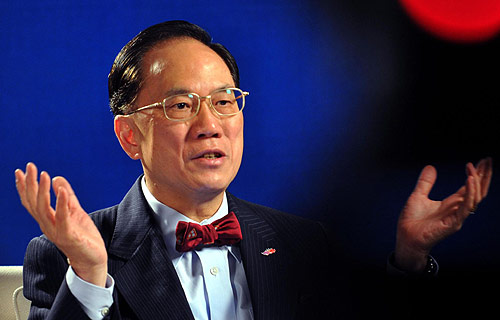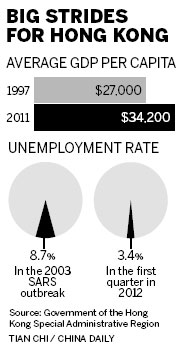
|
 |
|
Donald Tsang talks to Xinhua News Agency in Hong Kong, May 21, 2012. [Photo/Xinhua] |
"I plan to spend more time with my family, but I want to travel everywhere with my camera, too. I have really good equipment, but I'm afraid my skills aren't quite as good," said the chief executive of the Hong Kong Special Administrative Region, who steps down on July 1.
|
 |
But after seven years of running such a vibrant and prosperous city, his old passion — the welfare of Hong Kong and its people — won't go away any time soon. The pride in his voice as he spoke about what he regards are his greatest successes was obvious.
"There have been ups and downs," said Tsang, who will be replaced by the newly elected Leung Chun-ying. "It's always been my biggest honor to serve Hong Kong for almost half a century, traveling with Hong Kong people along a road that has twisted and turned, but has always led to bright prospects."
Tsang, 67, began to work for the Hong Kong government in 1967, when the territory was still under British control. When the handover to China happened in 1997, he continued in his role as a senior official in the newly created special administrative region.
He is credited with playing a vital role in the successful defense of the Hong Kong dollar and its financial markets against speculation during the 1997 Asian financial crisis, as well as in the region's recovery from the 2003 SARS outbreak.
After being elected chief executive in 2005, he successfully steered Hong Kong through the threat of bird flu and the 2008 global financial crisis.
In the 15 years since the handover, which ended more than 100 years of British control, the island has achieved a high level of autonomy based on the principle of "Hong Kong people governing Hong Kong", he said, as well as maintained its prosperity and stability.
Hong Kong's average GDP per capita has risen from $27,000 in 1997 to $34,200 in 2011, Tsang said.
Over that same period, financial services firm Standard & Poor's has upgraded Hong Kong's long-term credit rating to AAA, up three levels from its AA rating in 1997, making Hong Kong and Singapore the only economies in Asia with top ratings.
These achievements did not come easy, however, with Hong Kong facing two financial crises since its return to China.
Each time, the regional government not only conquered difficulties, but also had Hong Kong's status elevated, Tsang said, adding that this can be best illustrated by the inflow of international capital.
During the 1997 Asian financial crisis, speculators hit Hong Kong's currency and financial markets. However, in the 2008 global financial crisis, international investors chose to take shelter in Hong Kong believing that the market there was stable, reliable and offered good returns.
Because of the investors' confidence, Hong Kong has not faced much difficulty in finding financing in the past 15 years, Tsang said.
In 2011, Hong Kong surpassed New York and London for the third year in a row in the total amount of money raised by initial public offerings.
At present, almost everyone in Hong Kong has a job, said the outgoing chief executive. The unemployment rate is 3.4 percent now, down from 8.7 percent during the 2003 SARS outbreak.
The government has also made political achievements in advancing democracy, as it won support from central government authorities and Hong Kong's Legislative Council to have Hong Kong residents directly elect their leader in 2017 and all of its lawmakers later, Tsang said. Previous chief executives were elected by an election committee appointed every five years.
Tsang attributed part of the achievements to the support of the central government, including measures to stimulate free trade, boost tourism and to allow Hong Kong to become an RMB offshore trading center.
He dismissed claims that China's growing strength had exerted too much influence over Hong Kong.
"The impact of the country's fast growth is global, and affects not just Hong Kong but also the United States and Europe," he said. "What's important is that the government has followed the Basic Law and let Hong Kong keep its freedom and lifestyle."
Hong Kong has been named the world's freest economy for 18 consecutive years by the Heritage Foundation in Washington and the Wall Street Journal. The World Competitiveness Yearbook 2012, issued in May by the International Institute for Management Development in Switzerland, also listed Hong Kong as the world's most competitive economy for the second consecutive year.
"I have confidence that under the 'one country, two systems' policy, Hong Kong will maintain its prosperity and stability with its international links and support from the mainland," Tsang said.
However, he conceded that there will be challenges.
The masses care about short-term tangible interests, while the government has to plan for society's long-term interests, which results in conflicts, he said.
"But I have a strong belief in the people of Hong Kong," he said. "They are rational and tolerant. They seek common ground, while reserving differences. They stand up to challenges without fear."
"I am very excited about Hong Kong's future," he added.
Contact the writer at xindingding@chinadaily.com.cn







